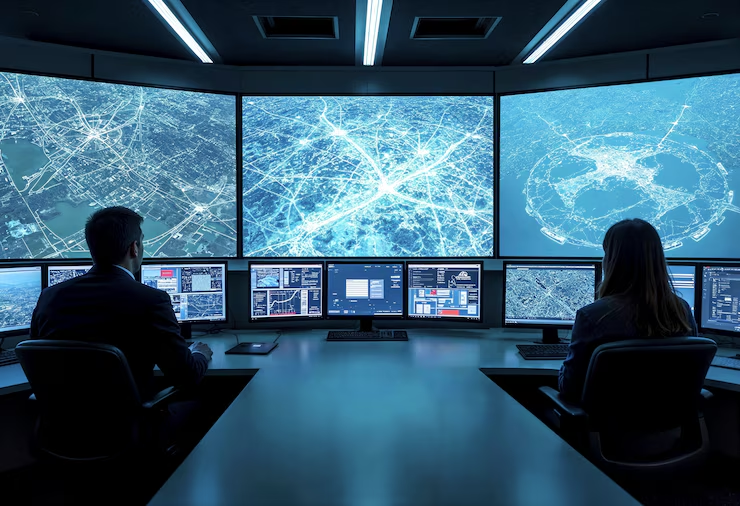It’s 3 AM in the city. Most people are asleep. But at the Integrated Command and Control Centre (ICCC), lights are on, and the monitors are active. Suddenly, a sensor detects smoke rising from a narrow lane in an old residential neighborhood. Within seconds, the ICCC alerts the nearest fire brigade, notifies emergency response teams, and activates surveillance cameras in the vicinity. By the time residents realize there’s a fire, help is already on the way.
This isn’t fiction – it’s happening in cities like Indore, Surat, and Bhopal right now. Behind the scenes, ICCCs are becoming the invisible backbone of smart urban life – responding faster than human reflexes, making cities safer, cleaner, and more efficient.
What is an Integrated Command and Control Centre (ICCC)?
At its core, an Integrated Command and Control Centre is the centralized hub where all digital systems in a city converge. It brings together real-time data from traffic signals, surveillance cameras, water and waste systems, emergency services, and more – making it the central nervous system of a smart city.
With dashboards, analytics tools, alert systems, and AI-driven decision support, the ICCC gives city officials the power to see, decide, and act – all in one place.
Implemented across India under the Smart Cities Mission, ICCCs are now operational in over 80 cities, transforming the way urban services are delivered.
A Day in the Life of an ICCC
Let’s take a look at a typical day:
- Morning Traffic Rush: AI-powered signals adjust automatically to reduce congestion.
- Midday Clean-Up: Smart bins send fill-level data, and waste collection routes are optimized in real time.
- Afternoon Citizen Complaints: A broken water pipe is reported via a mobile app. ICCC routes the complaint and monitors progress.
- Evening Rainfall Alert: Weather sensors indicate flash floods. Warnings are sent to residents in low-lying areas.
- Late Night Security: Surveillance cameras detect unusual movement in a public park. Alerts are sent to the nearest patrol unit.
All of this happens not through dozens of departments working in silos, but through a single, integrated, intelligent system.
Key Benefits of ICCCs for Smart Cities
Real-Time Monitoring
From tracking public transport to monitoring air quality, ICCCs give city managers a live view of what’s happening across the city.
Rapid Emergency Response
Whether it’s a road accident or a natural disaster, ICCCs reduce response times significantly – sometimes by up to 30-40%, according to municipal data from cities like Surat.
Citizen-Centric Services
ICCCs are connected with grievance portals, allowing citizens to lodge complaints and track them. This improves transparency and accountability.
Resource Optimization
By analyzing usage patterns, cities can better manage water, electricity, and fuel – making urban life more sustainable and cost-efficient.
ICCC in India: Smart City Success Stories
- Indore: Known as one of India’s cleanest cities, Indore uses its ICCC to monitor waste collection, air quality, and public toilets – leading to measurable improvements in cleanliness and sanitation.
- Surat: The city’s ICCC helped manage COVID-19 efficiently, using real-time dashboards to monitor patient movement, hospital beds, and containment zones.
- Bhopal: The ICCC here integrates over 1,000 cameras and 300 traffic junctions, improving road safety and reducing crime rates.
These cities aren’t just using tech for tech’s sake – they’re using it to make life easier for millions of residents.
Technologies That Power ICCCs
The tech stack behind ICCCs is impressive:
- IoT Devices: Smart sensors in water systems, bins, buses, and streetlights.
- CCTV Surveillance: High-definition, AI-enabled cameras for safety.
- Big Data & Analytics: Tools that process millions of data points daily.
- Geographic Information Systems (GIS): For spatial visualization and planning.
- Cloud Infrastructure: Ensures scalability, uptime, and security.
Together, these tools make cities more proactive than reactive.
The Human Side of ICCCs
Beyond the tech, ICCCs are run by people – data analysts, emergency coordinators, traffic engineers, and civic managers. These professionals work 24/7 to interpret data, respond to alerts, and keep city life running smoothly.
And for residents, the benefits are real:
- Safer streets at night.
- Cleaner neighborhoods.
- Faster issue resolution.
- Better public transport experiences.
Looking Ahead: The Future of ICCCs
As cities continue to grow, so will the complexity of urban management. The future of ICCCs includes:
- Predictive AI for anticipating disasters or service outages.
- 5G connectivity for lightning-fast data transmission.
- Blockchain for secure, transparent data sharing.
- Citizen dashboards for more community participation in governance.
ICCCs will become more citizen-focused, more automated, and even more essential.
Final Thoughts
The Integrated Command and Control Centre (ICCC) may not be visible on your daily commute, but it’s working silently to improve the quality of life in your city. It’s the silent guardian, watching over urban life — ensuring that services are delivered on time, emergencies are handled quickly, and cities become more livable.
In the journey to build smarter, safer, and more sustainable cities, ICCCs are leading the way. And as a resident, you’re already benefiting from it — whether you realize it or not.

